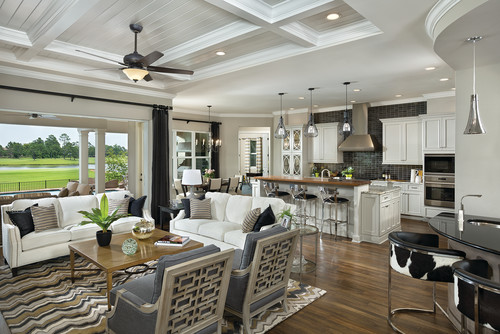Models are typically fancied up by the builder and interior designer and outfitted with all kinds of bells and whistles including upgraded flooring, countertops and appliances, lighting, window coverings - you name it. The idea is to show buyers what their home could be. If they have an extra $100K or more to sink into it.
If that's not you, either because you want to stay within a certain budget or you're already stretching to buy a new home, you don't have to forgo upgrades altogether. In fact, buying a home with builder grade everything is not considered a great idea from a value standpoint.
"A surprisingly large amount of the money you spend on your new home will be determined by the options and choices you make - and those options are forever changing," said New Home Source. "For example, granite countertops and stainless steel appliances, both considered pricey upgrades for years, are now standard in most new homes. However, going with the most common (or lowest) denominator is not always the best way to save—or spend - your dollars."
The cost
Ultimately, how much you upgrade (or not) is dependent on cost. Finding out that a model home has $86,000 worth of upgrades, which far exceeds your budget, can be devastating. Breaking them down to individual items and comparing the cost to what you would spend down the road is a good first step.
It's also important to remember that your selected upgrades don't require you to write a check to the builder. They get rolled into your mortgage. Add $20,000 in upgrades to your $400,000 mortgage, and you're looking at about $80 a month.
Yes, you may be able to finance your new floors or countertops at Home Depot, and you may even be able to qualify for zero percent interest. But, those payments will be spread out over only 24 or 36 months, instead of 30. If you're worried about adding to your bottom line, an extra $300 per month could hurt.
The value
In considering your options and upgrades, weigh wants and needs against potential value. "When selecting builder upgrades for your new home, you need to be strategic," said Houzz. "You want to choose the upgrades that will save you hassle and money by doing them upfront."
Some upgrades provide instant value. "The idea that you have to wait years to see a return on your investment is false," said New Home Source. "A quality refrigerator and freezer can keep food fresh longer without drying out - and with the cost of food rising, this is a savings you'll notice immediately," certified kitchen designer Joyce Gardine Combs told them.
Hardwood flooring is a classic that "never seem to go out of style," said New Home Source, and kitchen cabinets are a great way to go. "Moving up from standard cabinets to semi-custom gives you way-better construction and longer-lasting finishes," said Houselogic. "You'll get a wide range of colors and styles to choose from, lots of storage options, and long-lasting details such as dovetailed drawer joinery and cool hardware".
Other upgraded appliances may provide additional value - a great dishwasher can use less water and provide other energy savings. Quartz countertops may not be provide much in the way of cost savings but they do represent the most popular material today, which is predicted for many years to come. If it's something you just can't live without, and you'll regret not doing it from day one, the extra cost may be worth it. But, keep in mind the reality of countertops when it comes to new construction. "Though the glitz of sparkling quartz or luscious marble countertops may be pretty compelling to go for now, if you can wait and get them later, you'll gain choice and may end up saving money," said Houzz. "Builders typically use only one supplier for natural stone or quartz counters and may offer limited options. And with the builder's premium, the cost can be quite a bit higher than if you sourced the material and labor yourself."
You don't have to worry about contractors
We've all heard the horror stories about contractors, but even if you find a good one, you're still going to have to contend with having people in your home and making sure they show up on time (or at all), work within the agreed-upon timeframe and budget, and do what they said they will do. There is freedom in knowing that everything is going to be as you expected on day one, and that you don't need to worry about what happens if the flooring guy is sick or doesn't show up for work.
No mess
Your contractor will say they're going to clean everything up and leave your home spotless. They may even mean it and make a valiant effort. But, let's face it. You're going to be cleaning up dust for a while. And that doesn't account for all the mess that is created day to day. If you're staying in the house while these renovations are being made, expect to be dirty. All the time.
No fuss
Speaking of which…How many times have you heard people say the worst decision that they ever made was living in their home during a renovation? The alternative—relocating for a few days or more to a hotel could get expensive, and staying with a friend or family member will get old, eventually. When you upgrade before you move in, you avoid all the fuss, moving in to a brand-new home that's ready for you right away.
Written by Jaymi Naciri


